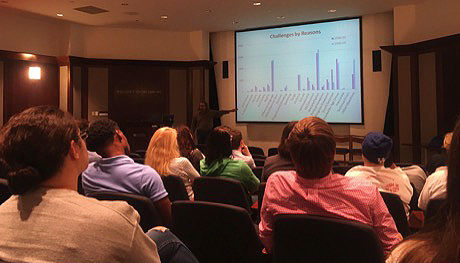UK students learn about banned books

Banned Books.jpg
October 2, 2016
The First Amendment has been under siege for centuries and UK’s English department is celebrating an annual, week-long protest to allow Americans their full rights.
Senior Lecturer Michael Carter spoke to a crowd during Banned Books Week in the William T. Young Library about the history of keeping books away from students and citizens alike because of their content.
His lectures provide a timeline of literature as far back as the writings of the famous philosopher Socrates to modern day classics.
According to www.bannedbooksweek.org, the Banned Book Week Coalition hosts the week.
Related: Center awards First Amendment defenses
“Banned Books Week was launched in 1982 in response to a sudden surge in the number of challenges to books in schools, bookstores and libraries,” the website said.
Many popular books, including Mark Twain’s “The Adventures of Huckleberry Finn” and Harper Lee’s “To Kill a Mockingbird,” were once added to the list of books that were at one time prohibited or challenged.
These were among the most surprising books placed on the “challenge list” for Carter.
“I remember being in fifth grade, reading ‘To Kill a Mockingbird’. I can’t imagine going without those books,” he said.
According to Carter, the reasons for these books being removed from classrooms and libraries vary, but in the United States the most common causes for bringing about a challenge are sexually explicit material or foul language.
A chart put on display during the lecture broke down the number of books that had been challenged over time and the reason for their challenges.
From 2000 to 2009, more than 15,000 books were challenged for sexually explicit material and another 12,000 were challenged for offensive language.
In the eyes of Carter, these reasons are not sufficient to keep the art from those he believes need to read it.
“Aristotle thought music was dangerous, that music would get in our bodies and make us do irrational things. It does. But it’s important that we don’t shut off the music,” Carter said.
Every year, libraries across the country voice their support for works of literature that have either been barred from publication or removed from public school curriculums and libraries.
The website for the American Library Association, the foremost sponsor for Banned Books Week, describes the week as “highlighting the free and open access to information.”
Director of the ALA’s Office for Intellectual Freedom James LaRue said Banned Books Week is critical to the U.S.
“Limitations of the freedom often mark the beginning of tyranny. Right now there’s an upsurge in challenges to books that fall into the area of ‘diversity,’” he wrote. According to LaRue, parents have been a driving force for the increased challenges for censorship.
“We’ve also noticed an upsurge in parents seeking advance notice about, and alternatives to, diverse titles appearing in high school English curricula.”
LaRue wants to protect the rights of the youth. “Minors’ First Amendment rights – even for ‘mature minors’ a year or two away from being old enough to marry, serve in the military, and vote – are under attack,” he wrote.
Banned Books Week for 2016 was Sept. 25 through Oct. 1. For more information, readers can go to www.bannedbooksweek.org or see the website for the American Library Association.































































































































































